Mosquito borne diseases overseas
In many overseas countries mosquitoes can infect people with dangerous diseases such as malaria, Japanese encephalitis, dengue fever and yellow fever. These are known as mosquito-borne diseases.
Protect yourself against mosquitoes
Anti-malarial drugs and yellow fever vaccination are only partially effective and do not protect you against other diseases transmitted by mosquitoes. The best protection is to avoid being bitten by mosquitoes.
Find out more about how you can avoid getting bitten by mosquitoes.
Dengue
Symptoms
Dengue causes severe flu-like symptoms including:
- fever
- headaches
- muscle and joint pains
- rash
- nausea and vomiting.
There are 4 different strains of dengue virus. An initial infection will result in dengue fever. However, a subsequent infection with a different strain can lead to a severe form of the illness that may be fatal if not treated appropriately.
The mosquito that transmits dengue breeds in water-filled, man-made containers in urban areas. It is often found near or inside buildings and bites during the day.
Prevention
There is no cure or vaccine for dengue. The only way to prevent infection is to avoid being bitten by mosquitoes.
Risk regions
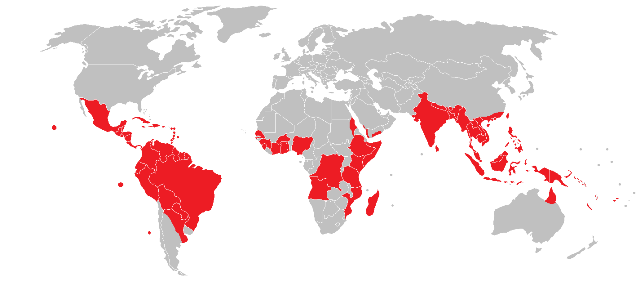
The risk of infection is high in popular travel destinations such as Indonesia (Bali), Vietnam, Thailand and India, however, dengue occurs in a wide range of countries. Many travellers from Western Australia return from south-east Asian countries with dengue infection, with Bali the most common source.
Malaria
Malaria is a parasitic disease transmitted by mosquitoes in a range of overseas countries. There are 5 different species of malaria parasite that can cause disease in people.
Symptoms
Symptoms of malaria include:
- headache
- fever
- chills
- fatigue
- nausea and vomiting.
In some cases, infection can lead to severe illness (coma, seizures, anaemia, breathing difficulties) and may be fatal if not treated appropriately.
Prevention
Always speak to your travel GP at least 6 weeks before you travel overseas. Pregnant women should not travel to regions where malaria is present, and parents should avoid taking young children to areas where there is a substantial risk of infection. If travel cannot be avoided, it is important to take anti-malarial medication to prevent infection. Your travel doctor will advise you if this treatment is necessary and can provide recommendations on the best anti-malarial treatment for your destination and length of time away.
Risk regions
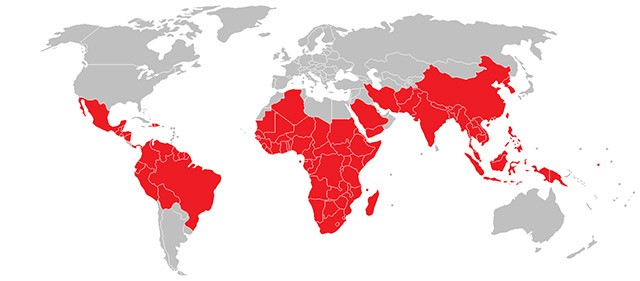
:
The risk of infection is particularly high if you are traveling to Africa, Central and Southern America, the Pacific or south-east Asian countries such as Cambodia, Laos, Myanmar and southern Vietnam. The risk of infection remains substantial in a number of other popular travel destinations in Asia, Central and South America.
Chikungunya
Symptoms
Chikungunya is a viral infection transmitted by mosquitoes in a range of overseas countries.
Symptoms of chikungunya include:
- fever
- severe joint and muscle pain
- headache
- nausea
- fatigue
- rash.
Symptoms usually persist for weeks, but in some cases can continue for months to years.
Prevention
There is no cure or vaccine for chikungunya. The only way to prevent infection is to avoid being bitten by mosquitoes.
Risk regions
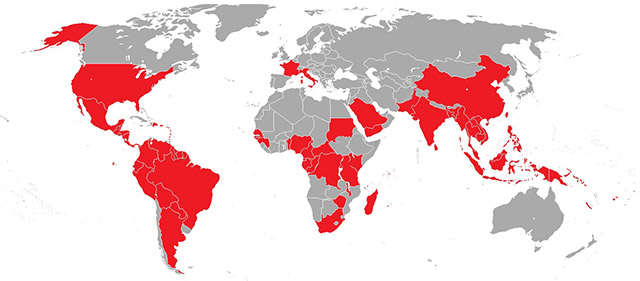
:
The risk of infection has traditionally been highest in Africa and Asia. More recently, the disease has emerged in countries in the Pacific and Indian Ocean regions as well as south-east Asia and the Caribbean.
Yellow fever
Symptoms
Yellow fever is a viral infection transmitted by mosquitoes. Infection can lead to two distinct phases of disease.
The first phase results in:
- fever
- muscle pain
- headache
- nausea and vomiting.
Patients often recover after 3 to 4 days. Some patients will enter a more serious, toxic phase where the fever returns, jaundice occurs and blood appears in the vomit. The toxic phase may be fatal if not treated appropriately.
Prevention
Vaccination is the most effective form of prevention against yellow fever, and is recommended for people aged 9 months and older who travel to areas where there is a risk of infection. A single dose provides lifelong immunity. It is very important to speak to your travel GP at least 6 weeks before travelling overseas to see if you need ;a yellow fever vaccine. Once infected, there is no specific treatment for the disease. Most countries have regulations and requirements regarding the need for yellow fever vaccination. If you have visited areas where the disease is endemic, a Yellow Fever International Certificate of Vaccination may be required in order to enter other countries and to re-enter Australia.
Find out more about yellow fever vaccination (external site).
Risk regions
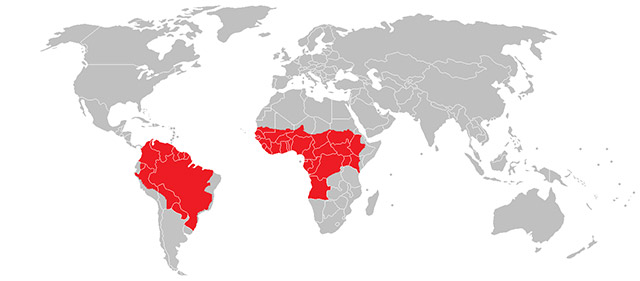
:
Yellow fever occurs predominantly in regions of South and Central America and West and Central Africa.
Japanese encephalitis
Symptoms
Japanese encephalitis is a viral infection transmitted by mosquitoes. Many individuals infected with Japanese encephalitis virus will have very mild or no symptoms. However, in some cases Japanese encephalitis can cause inflammation of the brain (encephalitis) resulting in:
- headache
- high fever
- disorientation
- coma
- tremors
- fits.
In such cases, infection can lead to permanent brain damage or be fatal.
Prevention
Vaccination is the most effective form of prevention against Japanese encephalitis. It is very important to speak to your travel GP at least 6 weeks before traveling overseas, to see if you need a Japanese encephalitis vaccine. Once infected, there is no specific treatment for the disease.
Read more about Japanese encephalitis in Australia.
Risk regions
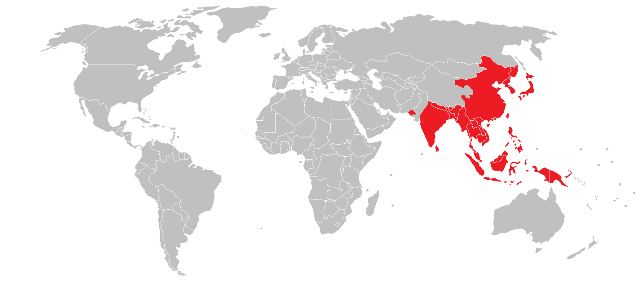
:
The risk of infection is highest in Asian countries, including several common travel destinations from Australia (China, Japan, Korea, Taiwan, the Philippines, Vietnam, Cambodia, Indonesia, Laos, Thailand, Malaysia, Papua New Guinea and India).
Zika virus
Symptoms
Zika virus causes flu-like symptoms including:
- fever
- headaches
- muscle and joint pains
- rash.
Recent evidence suggests that Zika virus infection in women during the first trimester of pregnancy may also be linked to abnormal foetal brain development.
The mosquito that transmits Zika virus breeds in water-filled, man-made containers in urban areas. It is often found near or inside buildings and bites during the day.
Prevention
There is no cure or vaccine for Zika virus. The only way to prevent infection is to avoid being bitten by mosquitoes.
Risk regions
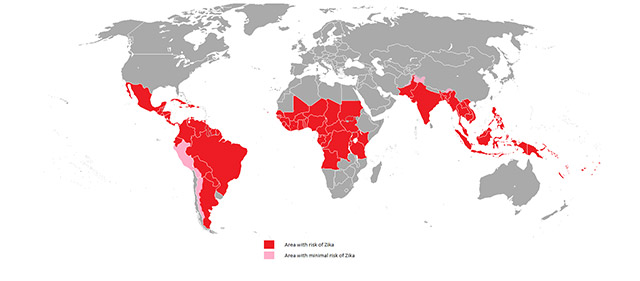
Local outbreaks of Zika virus disease have been reported from tropical regions in Africa and Asia with activity recently spreading into the Pacific Ocean, Central America, the Caribbean and South America – particularly Brazil and Colombia. Read more about Zika virus on Healthy WA and the Australian Department of Health website (external site).
Other mosquito-borne diseases
The diseases listed above represent the mosquito-borne diseases that West Australians most frequently acquire when traveling overseas, or that pose the greatest health risks. However, you should be aware that there are many other mosquito-borne diseases that occur worldwide. It is recommended that you always see your travel doctor before travelling overseas to seek advice on the risks associated with your travel plans, and the need for specific measures such as vaccines and antimalarial medicines, where these are appropriate.
Where to get help
- Visit a health professional if you become sick whilst overseas.
- If you become ill on your return to Australia, see your doctor immediately and advise them of your recent travel history.
- Ring healthdirect on 1800 022 222.
Last reviewed: 25-03-2022
Acknowledgements
Environmental Health
Fight the Bite is an initiative of the Government of South Australia.
This web content has been reproduced and adapted with permission from SA Health.
This publication is provided for education and information purposes only. It is not a substitute for professional medical care. Information about a therapy, service, product or treatment does not imply endorsement and is not intended to replace advice from your healthcare professional. Readers should note that over time currency and completeness of the information may change. All users should seek advice from a qualified healthcare professional for a diagnosis and answers to their medical questions.